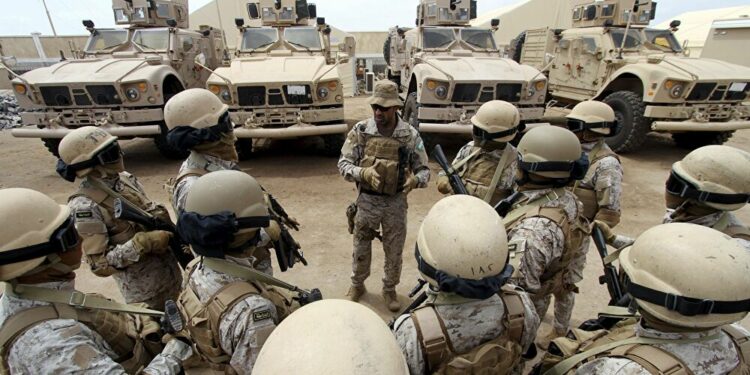
The Saudi opposition National Assembly Party has warned of new executions of Saudi soldiers for refusing to participate in the Yemen war.
This came in a statement by the party after the Saudi authorities recently announced executing three soldiers in Yemen on charges of high treason.
The party referred to the official and semi-official media campaigns that accompanied the execution, stressing its previous position to end this war.
The party stressed that the Yemen war “achieved nothing but losses for all parties, and inflicted great damage on our country and fraternal Yemen, and claimed many innocent lives on both sides.”
It pointed out that the war brought Yemen to a state described by the United Nations as the largest humanitarian crisis in the world. Saudi Arabia’s vital installations were bombed, many soldiers were killed, and large numbers were seriously injured.
The party said that “with all these heavy losses, and in light of the continuation of this war and its mistakes and risks, we were surprised by the Saudi authorities by announcing the execution of the three soldiers.”
The party explained that the execution was carried out in complete ambiguity and absence of the conditions for fair trials.
“This announcement, and the huge official media coverage that accompanied it, came in light of the deterioration in the morale of the individuals and officers participating in this war,” he said.
The party expressed concerns about the upcoming executions of others because they refused to participate in the war, their reluctance to bomb civilians, the destruction of infrastructure in Yemen, their rejection of the scorched-earth policy that is pursued from time to time, or for other political reasons.
“We remember again that this war, like all other hasty decisions, was not made by the people through its elected civilian institutions, nor was it taken by the military institutions with their experts and officials.”
“Rather, it surprised everyone, including the military, with the war decision taken by the Crown Prince and his father unilaterally, and for personal interests related to the Crown Prince’s endeavour to highlight his image and play a role in the region, without regard to the interests of the homeland, nor to the safety and future of the region, nor to the sanctity of blood.”
This caused a deterioration in the military’s morale and the withdrawal of the allies who decided to participate in the war before they understood the Saudi motives for what they are, according to the party.
The party cautioned that most of the supporters of the war, even among the Yemenis, had retreated after the real Saudi goal became clear so that the Saudi military would stand between fighting the battle alone and paying the price without believing in it or facing the penalties for his refusal, which seem to amount to execution on charges of high treason.
The Assembly Party emphasized that the war was not the only thing that troubled the military, but rather that it had been preceded by a series of measures that had wronged them and inflicted great harm on them.
“After they (the Saudi military) complained about poor salaries, many bonuses were deducted recently, without the slightest justification for that,” he said.
He added, “The poor health services, the difficulty of housing, and the rampant administrative corruption that may deprive the military from his licenses or promotions due to administrative corruption continued.”
He added, “Or he may be subjected to unfair transfers, appointments that are not sensitive to circumstances, and selective in appointments, transfers, sessions and assignments.”
He pointed to “removing the homes of some of the soldiers stationed on the fronts, forgetting, ignoring, and failing to treat some of the front’s wounded, including amputees, and arrests and accusations of those who express their opinion or legitimate demands.”
The party highlighted that the worst of all is robbing the national spirit from the military sectors, making it a service for the authority, not for the country, and establishing that the military sectors are a service for the king and his crown prince, not for the homeland and its institutions and protection for the people and its capabilities.
The National Rally Party condemned this abuse of the military and the repeated insults to the military institutions.
And he called for not to be underestimating the blood of the nation’s soldiers of all ranks and sectors and not to expose them to danger by waging futile battles.
The party also called for strengthening Saudi military institutions and allowing leaders to build them to serve the country and protect the people.
He stressed the need not to use these institutions to pass corrupt deals or subject them to political use by political leaders who do not have the experience or ability to run military institutions.
The party called for supporting the military with health services, housing, salaries, vacations, and benefits that raise their morale and enhance their national belonging.
It also called on the military leaders to stand with their employees, defend them, enhance their value, preserve their rights, and support and assist them in building effective and robust military institutions of national affiliation.